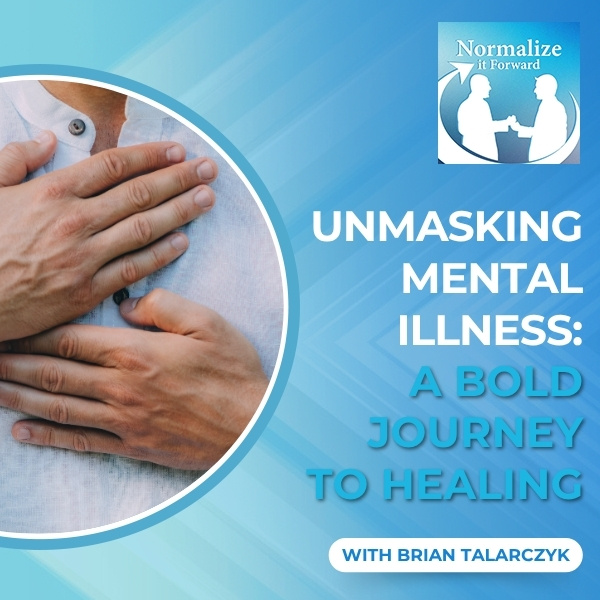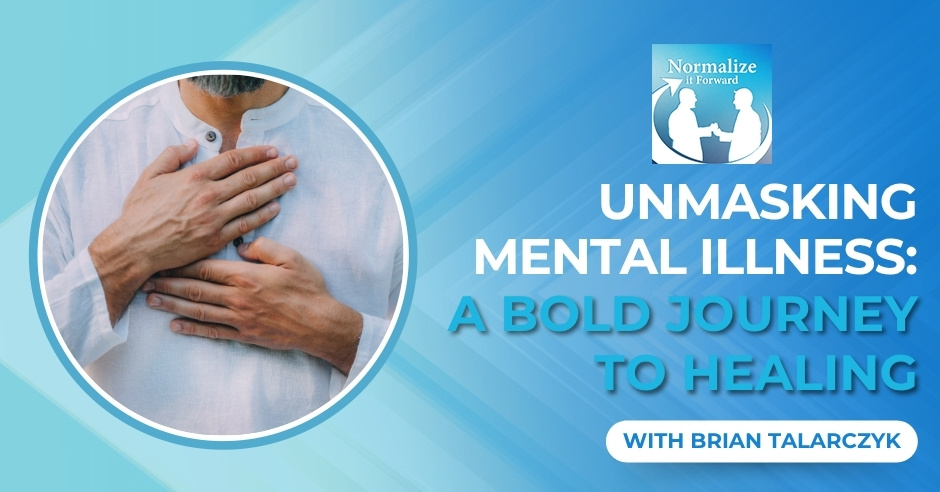
Ever wondered what it really takes to face your deepest mental health struggles head-on and emerge stronger? Tune in for a powerfully honest conversation with Brian Talarczyk, author of I Am Not Bipolar. Brian shares his personal battle with mental illness, offering crucial insights on the importance of seeking help, navigating psychotic episodes, and reframing stress as a sign of growth. Discover his unwavering commitment to authenticity and how giving back to the community is integral to his own mental wellness journey. This episode is a testament to resilience, vulnerability, and the strength found in open dialogue.
Reading about mental health is hard. Let’s schedule a free consultation.
—
Watch the episode here
Listen to the podcast here
Unmasking Mental Illness: A Bold Journey To Healing With Brian Talarczyk
I am here to talk openly about mental health and wellness. I’m super excited to welcome my guest, Brian Talarczyk. Brian, how are you?
How are you doing? Thanks for having me.
Good. Thanks for being here. I appreciate it. Brian is a writer, a mental health advocate, and a Management Consultant, and has a passion for promoting mental wellness in one’s personal life and professional endeavors. Brian is the Managing Director of the Kravit Group, a tech advisory firm, and a Cofounder of Colchester Cares, a charity foundation serving the local community in Connecticut, where he lives with his wife and two children and their golden doodle, Sally. Brian, welcome.
Thanks, Marc. Nice to meet you.
Why don’t we start things off? Brian’s book, an awesome book, I Am Not Bipolar, was recently written and put out. I guess I want to ask you a general question. How are you feeling about the book being out in public these days?
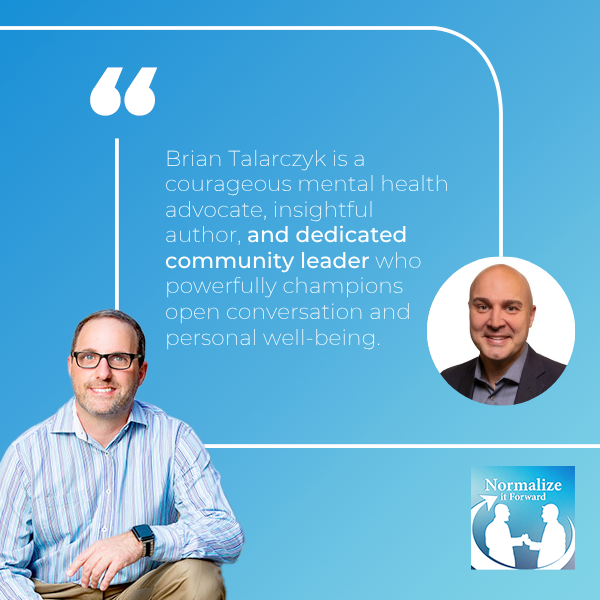
I feel pretty good. It was a little nerve-racking at first to think about exposing the private parts of my life openly to everyone, but enough time has passed since a lot of those events occurred that I have a lot of perspective on things. I’ve grown up a lot, and I think it’s okay. I’m feeling pretty comfortable about talking with people about it. The more I talk with others about it, and the more people tell me about their stories and their sisters and their brothers and their uncles in conversations I never would have had about mental illness had I not openly shared my mind. That was part of the point.
Number one, I want to thank you for writing this. I want to thank you for putting it out there. I think it takes a lot of guts to write about yourself and write about your journey. If you didn’t get the title, I Am Not Bipolar by Brian Talarczyk. Certainly look it up. It’s a great book. I think you were very honest and very open in this book. As a therapist, I put together this show to bring mental health out there to the community and to get people to understand that, number one, we’re all susceptible. Number two, many people out there are suffering with their own battles.
Sometimes they’re suffering in silence. I think your stance of writing this book, this show, all sorts of things that are being done out there are helping people. They’re helping people understand that it’s okay. As a phrase goes, it’s okay to not be okay. It certainly means that people are getting the help that they need and being able to survive, stabilize, and live their lives.
We appreciate you as therapists. Those of us who struggle appreciate folks to help us, guide us through some of the challenges that we have, and have somebody else to talk to in some cases when you don’t have anybody else to talk to. That’s part of my experience as well, working with therapists. I’m glad that people are talking about it more. That’s the one thing that I am certain about related to mental illness and bipolar disorder. For a lot of reasons, people are talking about it more, and that’s a good thing. A show like yours and others, that’s a good thing.
As I was telling you earlier, a lot of my audience is young adults, and young adults are struggling. The mental health stats out there are not pretty. Anxiety is up, bipolar is up, depression is up, and eating disorders are up statistically. What I find regularly working with that population is that, oftentimes, kids are struggling by themselves. They’re not bringing friends in or support in, or parents in or therapists in, and things undoubtedly get much worse for kids. I guess I’m wondering, when you made the bold decision to go see a therapist, for the first time you did that, tell us a little bit about that experience and what you went through, the steps that it took, and the obstacles that were sitting in front of you.
The Decision To Seek Therapy & Overcoming Initial Obstacles
I was 27 years old when I was first diagnosed, and it came on the heels of a more severe manic psychotic episode, following which was a major depressive period. To answer your question about going to see a therapist, the decision was born largely out of fear. I started having suicidal ideations. I was in a very hopeless state. Yale New Haven Psychiatric Facility had connected me with a doctor in Virginia, where I was living at the time.
At first, I ignored going to him, denying that their diagnosis was wrong. When I got into that severe depressive state, I knew I needed to see someone. It was out of that, and then I went and talked to somebody. From there, it was time that got me comfortable with talking with somebody else about it.
To your question, it was very difficult to put myself in a car and drive to a therapist’s office and then ultimately admit that my brain functioned differently from others. There was something to this diagnosis that’s not a comfortable place to be. It took many years to accept that and feel comfortable even talking to a psychiatrist about it. That’s what was going through my mind. It was more out of desperation for me after one specific event than a series of symptoms of feeling anxious and depressed, and those kinds of things.
I know a big theme in your book was the passing of your father. Remind me, how old were you at the time?
I was 27 and he was 55.
I know that was one of the major events that set things in motion for you. What I wanted to ask around that time period, and as a therapist, I’m on the other side of this, and so I’m fascinated by this process, is a person comes into my office for the first time and they’ve been newly diagnosed. Let’s say they’re right out of the hospital. I’ve been doing this for a while.
This is not my first meeting. This is their first meeting. I have to take into account that this is overwhelming and maybe a little surreal, like, “Is this really happening? Now my life is going to be different because I have this lens to look through,” but in many ways different and good. It opens up opportunities, and I can be honest with people about this is why this happens. I wonder how big an obstacle that was for you?
The Impact Of Suppressed Grief & Understanding Psychosis
A big obstacle. It certainly was at first, like we were talking about. For me, it came on the heels of my father’s death six months prior before I had my first psychotic episode. In that time, I suppressed the grief. I ran away, thinking everything was fine. Yes, he passed away, but we’re all going to be fine. I didn’t talk about it with anyone. I didn’t talk with my family about it. I ran away from it.
It was through that suppression that triggered my illness surfacing for the first time. Even though I was 27, there were no signs of bipolar disorder or anything. It exists in my family, but it did not exist no signs with me in any way that I would’ve known. To your question, I feel like that exacerbated the situation, and walking in and seeing that psychiatrist for the first time was not just an exploration into dealing with my diagnosis, but also beginning to realize that the cause of this was the suppression of grief. That all bubbled up, and eventually, chemicals went the right way, and I found myself psychotic, and it happens. I think that piece of it, I focus on a lot in the book, because suppressing our emotions in any form isn’t healthy.
It sure isn’t. I think it’s also avoidance. It’s a natural tendency when we don’t have that muscle built up in our body. It’s like, “I don’t know what to do, so I guess I’ll just avoid it.” A lot of people end up doing that. You’ve used the word psychotic, I’m familiar, but I guess I’m wondering for my readers, can you explain that a bit? What do you mean by that?
Psychosis, for me, I can give you an example of my first psychotic experience. I hadn’t gone home to visit my family after my father passed away. I was living in Virginia at the time. I hadn’t gone home and talked to them like I normally would. I avoided being there, suppressing that grief. I left Thanksgiving dinner, and a lot of memories swirled around being in my childhood home and that kind of thing.
I went back to Virginia, and I started doing a lot of activities, your standard hypomanic activities, like running more than I normally would, forgetting that I ran, so running again, working feverishly on things that I could never finish because I didn’t know why I was doing them. It elevated to manic behavior. The psychotic part of that was transitioning from reality and what was happening around me to an abstract reality that I was creating.
The narrative of my psychosis was coming to believe that my father was still alive, that his death had been faked, along with a whole bunch of other things surrounding September 11th, because that happened during that time period, a few months prior. I went on a search to find my father. I went up and down the East Coast, looking for clues. I heard voices inside me that he was talking to me and guiding me. I fell into an abstract reality, something that didn’t exist.
I was operating in the real world, but my world was filled with terrorists chasing me, and everything became a metaphor of itself. There’s a white panel van over here, driving next to me with an American flag. Is that a terrorist? It was an abstraction after abstraction. Going from reality, it’s not reality. For about a week period, not even longer than that, operating there. I don’t know if that answers your question. That’s an example of psychosis. I’ve only had two of those episodes in my life, but they were both as doozies as those are.
It sounds scary. I appreciate you breaking that down for us. A lot of times in my office, I talk about psychosis as it can be delusions, it can be paranoia, or it can be hallucinations. Sometimes they are a combination of all three, and they’re caused by a variety of things. The premise I keep coming back to when I run into it with patients is that we believe our reality. If we’re thinking it, we’re believing it. As you said, you become separated from what is real, and that’s scary.
That’s scary because you’re in that zone. You don’t know how to stop. I appreciate your candor around this and the pure honesty around what this was like for you. I’m curious. I tend to ask this question a lot in my interviews, because I think it’s helpful for my readers to know, if you’re speaking directly to a college student, which in many ways you are right now, and they’re struggling, they’ve got something going on that is clearly above their pay grade and they don’t understand it, but it is out of control. Whether it’s excessively restricting their diet or cutting themselves or having lots of anxiety that they cannot control, do you have any general advice for that student?
The Importance Of Talking To Others
The most specific thing that comes to mind was the struggle I went through, and it took me a very long time to understand what I needed to do. That was to talk to others. I know that’s very direct and probably easy to say. It doesn’t need to be a therapist. If you can talk to a therapist, that is extremely helpful because they’re looking at it from a professional clinical perspective and can help you in other ways. Talking with someone and taking a pause and a time out from whatever you’re doing in your life, and realizing that your life and your health are much more important than what’s in front of you right now.
Whether it’s an exam or a date you’re going on, or I don’t know anything, even a class you’re supposed to go to that you can’t miss because the professor might fail you, or whatever the case may be. Nothing is more important than your mental health at that time. When you come to that space, step away from what you’re doing and talk to someone.
Nothing is more important than your mental health in that moment. When you reach that space, step away from what you’re doing and talk to someone—anyone. Share on XIt’s great advice. It’s interesting. I’ve given that advice before, and so many people will say back to me that they don’t understand. If I miss this class, my professor won’t understand. You know what, 9 times out of 10, they do. You hear something back in an email like, “I totally get it. My daughter has excessive anxiety. My cousin, my niece, my brother, I.” People get it way more than we think because, by numbers, a lot of people are suffering.
The numbers are skyrocketing. You look at the effects of technology and other things that are pointing to anxiety and depression increasing in folks. You’re right. On the other side of that conversation, from a professor’s standpoint is they have a family. They understand the stress of the things they need to do in their job. They’re grading papers. They might themselves have anxiety over not being able to do much. There’s humanity on the other side of that, not a relationship that’s superior, inferior. In that case, I would encourage students to talk to their professors and/or their advisors and make sure they know what’s going on. They probably will more than understand and be there to help you.
It’s great advice. I’ll add to that, not only are all of those things going up, but so is the suicide rate. It’s so disturbing to me that every couple of months, I hear about another person who took their own life, and in most instances, needlessly. A lot of times, it comes down to people saying things like, “I had no idea they were struggling,” because they didn’t tell anybody. As you said, there’s nothing more important than health and safety. I don’t care what class you’re in, I don’t care what job you have, I don’t care what you’re doing. There’s nothing more important. Great advice
When you’re in that space, for me, I never attempted suicide, but in the two major depressive episodes I had, I had so many suicidal ideations, and they were derived from a feeling of hopelessness. I lived alone at the time. In both those instances, that made things much more difficult. Even if I wanted to talk to somebody, somebody wasn’t there. What I would say to any of the other readers out there and parents, figure out how to be present. As a parent, you can’t pull somebody out of the hopeless rabbit hole. You won’t be able to do that, but be there and make sure that they know that the line of communication is open. From there, try to be there to help them.
I always say showing up is half the battle. Probably the other half is listening, but being there for your young adult is important. I think you said it well. You can’t force them to share about all of these deep, dark things that they’re going through. Trust me, the fact that you show the fact that you’re there, the message that that sends, and the opportunity that they have now, they have a mom, they have a dad, they have an aunt, they have an uncle, they have someone there that they can share with is huge. It’s really big.
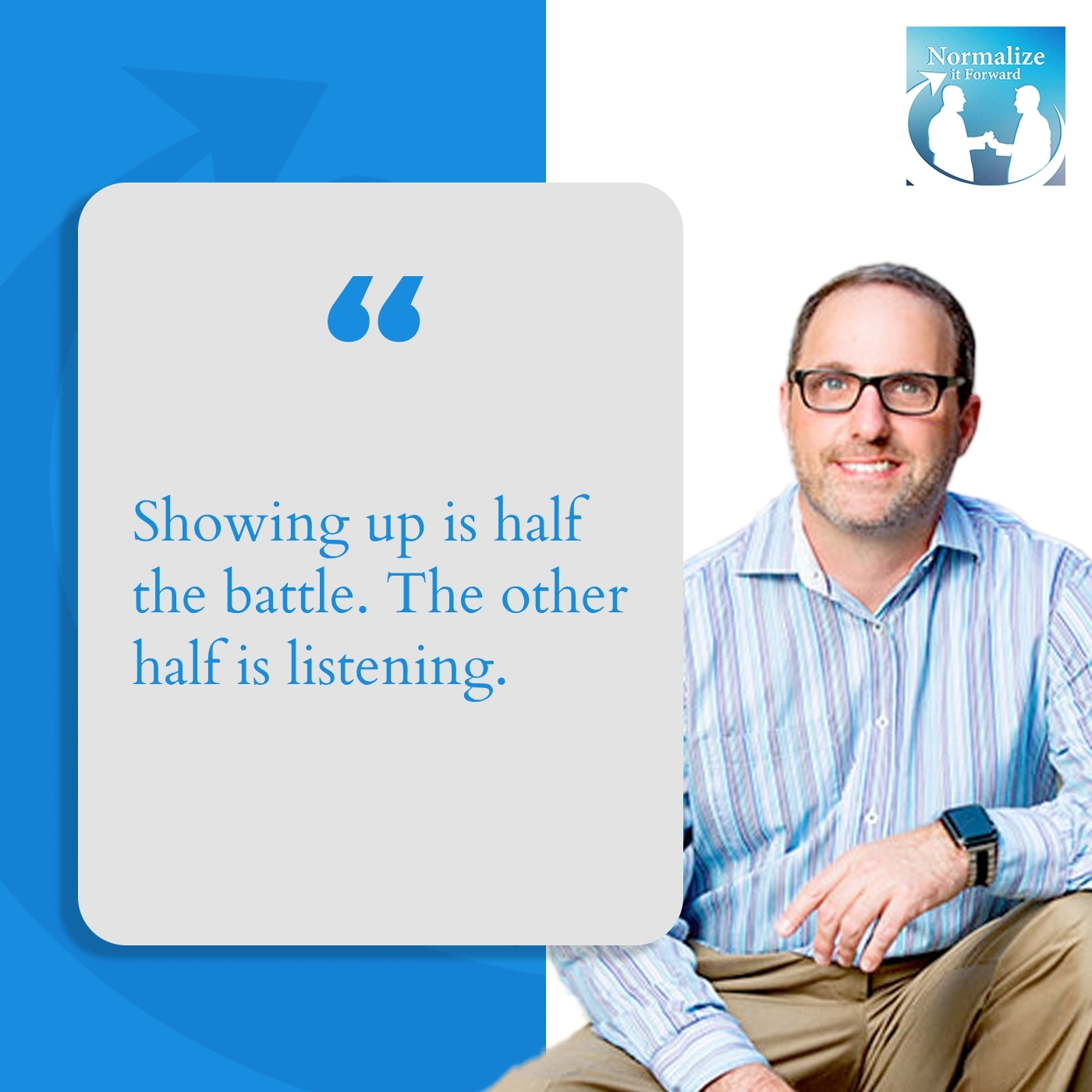
I had a friend of mine, during my second episode, who didn’t know what to do, and was very concerned about me when I was in the hospital during my second hospitalization. He didn’t know how to respond to it. I was living on the north shore of Boston at the time, and he was in Connecticut, and he drove to New Haven to get famous Pepe’s Pizza. He drove up to the hospital in Boston and sat with me, and ate a pizza. I’ll tell you, to this day, I still remember that conversation. I remember sitting there with somebody who went out of his way to do this, and it meant so much to me. For the parents and students out there, it’s that experience that those who struggle don’t forget.
That’s a great example. I would also say that can be uncomfortable. I’ve been to psych hospitals, but most people haven’t, and so to go and visit a friend and sit there and be there, and the message that sends is, “I care about you. You’re important to me. I care about you and I want you to know that while you’re struggling in here, we’re thinking about you.”
I push parents to understand that concept. I have parents say to me all the time, “That’s going to be uncomfortable,” so what? Going to a funeral is uncomfortable, too, but we do that. We do that for good reason. Sometimes, you have to push yourself and be in those spots. I’m a big fan. I have a good friend I interviewed a while ago on this show who lost his son, unfortunately, to suicide. Ever since then, he has made it a point to tell his friends how much he loves them. It doesn’t matter if you’ve known him for a long time or a short time; he tells you because it’s important.
I think some things come out of these experiences that are very important for us to pay attention to. I wanted to ask because I know a big part of this book, or the writing of this book, was for your kids. I know that through the note that you wrote to them in here, it feels like a vehicle for them to understand their dad a little bit more. Tell me a little bit about that.
It’s dual-purpose. The first is the discussion around mental illness in my family. On my mom’s side of the family, bipolar disorder existed in that generation in the ‘60s, ‘70s, and ‘80s. When I grew up, it wasn’t discussed at all. Manic depression was what bipolar disorder was previously called. It was something you didn’t talk about. While it may be hidden now, back then, it was hidden. We didn’t talk about it.
The first purpose of addressing the kids in the book is to say, “This isn’t right. We should pass these things down. This is a genetic illness. This isn’t something that I chose. I inherited this. By the way, you may, too, one day. We don’t know, but I want you to know two things. One is we’re going to talk about it well in advance of if that were to happen.” Neither of my children exhibits any behavior associated with a mental illness right now, but that could change for me. It didn’t surface until I was 27. That’s the first thing.
The second thing is, as parents, we put ourselves on pedestals to our kids to say, “I don’t have these struggles. My life has been perfect. I’m your dad. I should hide what things that have happened in my life.” My mental illness experiences have made me challenge that a lot and to be like, “I think you should learn from a bunch of mistakes that I made, and there are plenty. I want to tell you about them.” The short letters to the kids are in the book. That’s where it was derived from.
That’s not a literary device. My kids are young now, but in a few years, they’ll be in middle school. I hope that they choose to read the book. I wanted to be honest with them through the book, leave them some notes to say, “This is what’s going on, and this is my relationship with you. It extends through this book, too.” It’s those two purposes it serves. The biggest being, I think kids should learn from our own mistakes as much as theirs. That’s where I’m at, especially with my mental illness experiences.
Kids should learn from our mistakes as much as their own. Share on XThere’s a human quality to you that’s special. You’re able to talk openly about your flaws, which we all have, by the way. I think speak to them honestly with your children. To me, that is such a huge leg up for your children because if you think about our parents’ generation, that never happened. They were just as flawed, if not more flawed.
I think that for this next generation of young adults, whether elementary, middle, high school, or college, for those kids to understand the advantage of the openness of conversation around this stuff, the advantage is that it’s no longer in the corner. It’s no longer not being talked about. It’s no longer, “We don’t know what the statistics are.” We do. We know what the statistics are. They’re not great, but we do know.
Just like anything, heart disease, diabetes, we know that if you’re getting help for it, the chances of it beating you are much less. We want to grab that control and be able to manage our condition, whatever our condition is. Funnily enough, I’ve had asthma my whole life, and I always tell my patients like, “It’s my job to take my inhaler with me to be careful about certain environmental situations that trigger it. I have to manage my condition, and if I don’t, it has no problem managing me.” I think that’s true for most conditions.
Managing Mental Illness & The Concept Of Self-Care
It’s true. For me, I usually leave a lot of conversations like this saying, “I might come across to you as someone who’s been able to be open around my own experiences or might come across as someone who has tackled his past and is moving forward.” The reality is that there’s no cure for bipolar disorder or any other mental illness. There’s only the ability to manage it. There are ways that I work to manage that every day.
A big one for me is overworking. I’m self-employed, and I take on so much client work like yourself at a time, and I have learned over time to never take on too much that I can’t do, because then, I’ll try doing it all at once. That’s what ended in not-so-good circumstances for me. I think there’s a list of things everybody needs to do to manage their own mental health. That list is very different for everyone. Everybody’s circumstances, everybody’s genetics, everybody’s position in life are very different. The most important thing, like your asthma, is to say, “There is something I need to do,” and never wake up in the morning and say, “I don’t need to do this today.” Remind yourself of that.
I put it in the basket of self-care. As we get older, we’re making sure we’re getting our annual visits to our doctors and our eye doctors and our getting our teeth cleaned and doing all the maintenance stuff that we’re supposed to be doing. I think part of self-care, as young adults get into adulthood, is them recognizing this is an extension. If you belong on medications, don’t let them run out. If you’re seeing a therapist and you need to continue, keep going. Continue to do that.
The self-care aspect of it is so important. As basic as this sounds, self-care comes down to us. If you decided one day, “I don’t want to go see my doctor anymore,” then you don’t. You’ll suffer consequences, but that is your choice. The self-care piece, I feel like the decision comes down to the person. I think that I try to get people to understand I’m a human being as well as a therapist. It’s like I make decisions every day to manage certain things with myself. I’m not perfect. I certainly make mistakes. The same goes for you, Brian. Our journey is we try to manage ourselves as best we can.
I talk in the book a little bit about my therapist at the time was pointing me towards my inner self, working with me to come up with ways to manage my mental health, but more was forcing me to have a conversation with myself in any way that I could. One of those was keeping a personal journal from which this book eventually evolved, dealing with some of the PTSD disturbances that I had from my psychosis.
The way I approach it in the book is, as somebody who needed therapy, I was looking for external guideposts. I was traveling through the woods and looking for other people and other things and medication to make me well again. My therapist and others in my life were pointing me towards my inner self. Having the conversation with myself about self-care and those things I needed to do, and not necessarily do this and everything will be fine for you. That took a long time to grasp hold of and understand. For me, it’s over a decade, which was at least nine years too many, but it’s true. The concept of self-care is at the forefront of maintaining mental health.
A lot of wellness comes from doing for others, not just yourself. There’s real power in being selfless—it creates a positive spiral of helping others and caring for yourself. Share on XI can’t help but notice the picture behind you. Colchester Cares. Tell us a little bit about that.
Colchester Cares was one of the 500 wonderful ideas that my wife has had. I had to give her a plug here. We live in Colchester, Connecticut, and Colchester Cares is a giving group. It was formed in the middle of COVID. To sum things up, there’s a group of people, all the members of Colchester Cares come together once a quarter, and you can team up with a couple of people if you want. It doesn’t just have to be you, but everybody throws in $100 towards a pool of money.
Everybody raises causes that are needed in the town. It might be a Boy Scout who’s looking to rebuild park benches at one of the parks. It could be the fuel bank that’s looking to raise money because it’s October, or whatever it is. Everybody brings up causes, and then we distribute out the causes and everybody votes, all the members vote. We pool our money together. The top three causes are ranked to get a third of the money pool.
We do this every quarter. They’re called giving circles. It’s not uncommon. It was my wife’s idea to center it on our town. That was the piece of it. We were part of the Giving Circle in Southeast Connecticut. It served all of Southeast Connecticut. We’ve centered all of it on our town. We’ve grown to about 60 members now, and we’ve given out about $65,000 in money to the town in four years. It was my wife’s idea. I went along for the ride after.
We’ll give her credit. What a great idea. I love it.
It keeps us centered on the community. We have a wonderful community here in town, and it has connected us to a lot of people who do a lot of philanthropic things and make the town run. It’s always the same group of people that are managing the ball fields and the same group of people that are putting on the carnival and stuff.
That’s nice. Out of curiosity, because I feel like there is a connection here. Giving and giving back and taking care of people in your community, can you connect that to wellness? Give us a sense of how they relate.
A lot of wellness is doing for other people and not necessarily myself. There are some good vibes and emotions that come out of being selfless and helping others. It spirals into a balance of taking care of yourself and helping others, kind of thing. We all have that in our relationships and whatnot. There’s a balance associated with it. Ultimately, Colchester Cares and other things like that, my involvement in the local community sports, I’m involved with coaching Little League, those kinds of things. Giving back is a big part of my mental health. It helps me focus on someone other than myself and get myself out of my own thoughts sometimes.
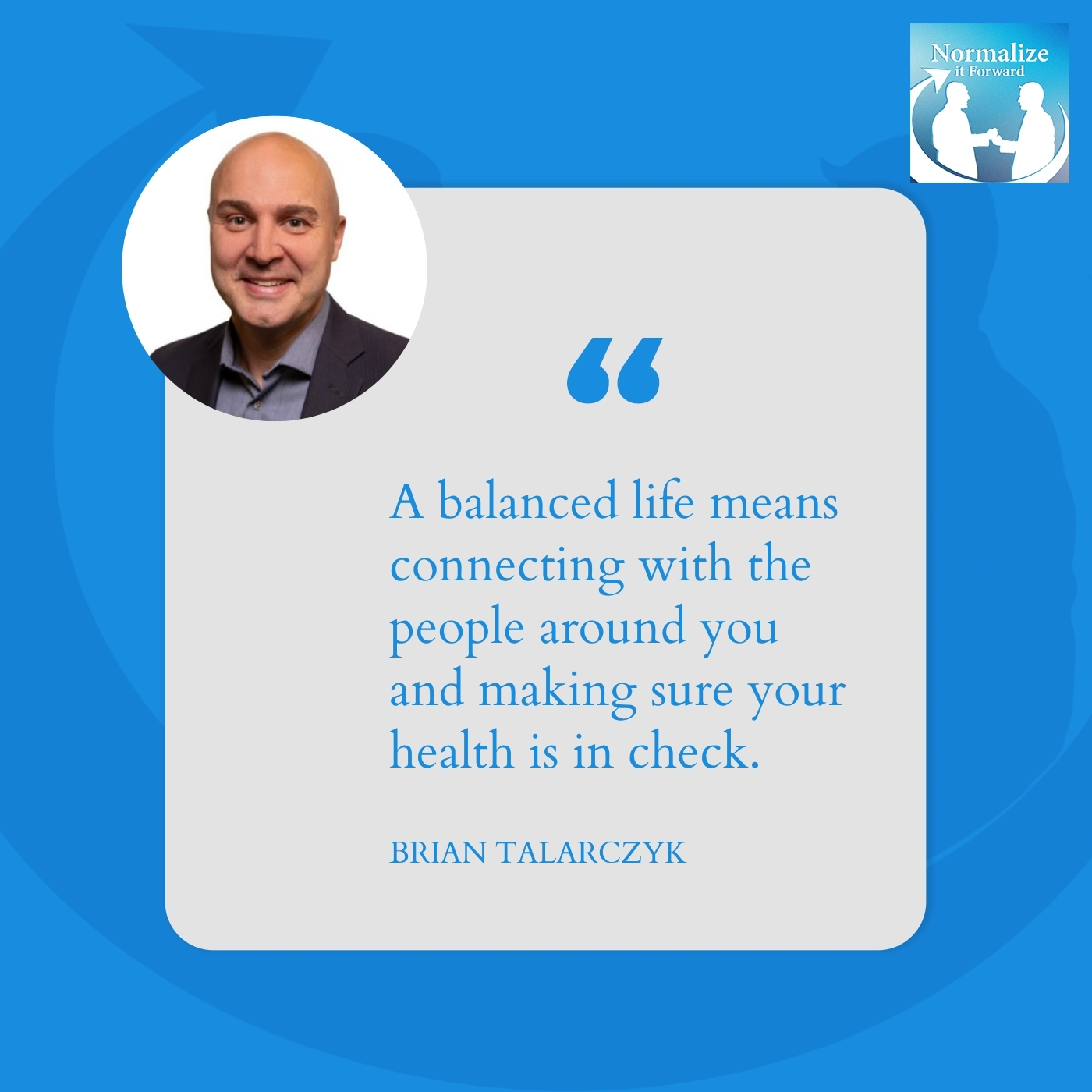
Brian, let me ask you this. First of all, I appreciate you spending this time with us. I know you’re busy. I know you’re doing a lot of different things. Your book, I Am Not Bipolar, by Brian Talarczyk. Go check it out. I read the book. It’s a fantastic book. A really good read, and full of information that will resonate with lots of different people.
Brian, if I could ask you, in general, because you’ve got people out there, parents that are concerned about their kids, or you’ve got young adults that are concerned about themselves, and I guess I’m wondering a general piece of advice or information to get past that notion of, “I’m paralyzed, I don’t know what to do, so I’m doing nothing.” What do you think?
There’s an image on the front cover of the book that’s a seesaw. To summarize it all, to me, it is to think of your life not as being on the swin alone, but a happy and balanced life is, pun intended, sitting on a seesaw across from the people that you love, that you can talk to about your own mental health, and know that it’s very natural for there to be ups and downs in your life. Nobody’s life is ever Steady Eddie.
Even if it may seem to you that it is, that’s not how it goes. A balanced life is talking with the people across from you and making sure that your health is in check. Maybe their health is in check, and that’s true for any relationship. Parent, child, spouse, teacher, student, brother, sister, whatever the case may be. Stay in balance on that seesaw.
Great advice. I would further that by saying I was blessed with a big mouth, probably why I became a therapist, but a lot of people aren’t, and a lot of people are shy. A lot of people, culturally, don’t share openly. They’re introverted. I always tell people, find a way. Find a way, find your person or several people.
As you mentioned earlier, Brian, it doesn’t have to be a therapist, but find a trusted individual to share with because they’re out there, and they’ll help you. One of the best parts about your story, Brian, is that you got the help that you needed. You’re still on your journey, but the sun is shining and the future is bright. I’m thankful for that. I’m happy for you for that. I appreciate you spending the time with us.
Marc, thank you very much. This has been wonderful. Good luck in the future.
I appreciate it. You take care.
Important Links
About Brian Talarczyk
 Brian Talarczyk is a writer, mental health advocate, management consultant, and philanthropist with a passion for promoting mental wellness in one’s personal life and professional endeavors.
Brian Talarczyk is a writer, mental health advocate, management consultant, and philanthropist with a passion for promoting mental wellness in one’s personal life and professional endeavors.
Brian is the Managing Director of the Kravit Group, a technology advisory firm, and the co-founder of Colchester Cares, a charity foundation serving the local community in Connecticut where he lives with his wife, two children, and their spunky goldendoodle, Sally.
Reading about mental health is hard. Let’s schedule a free consultation.

